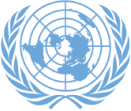I join with those who have spoken before me in congratulating you, Mr President, on your election to guide the work of this 63rd Assembly of the United Nations.
As we meet this week, the global financial system is confronting its sternest test in recent memory. The current crisis is systemic in nature, historic in scale, and global in reach. It comes at a time when the world economy is still wrestling with the most rapid escalation, and the highest real levels ever recorded in the prices for fuel and food commodities. Together with the world’s belated attention to the devastating economic and social implications of climate change, these developments define the agenda before global institutions and national leaders today. They make the theme for this year’s debate both timely and necessary.
Given the gravity and urgency of the issues before us, we must be careful not to conduct this year’s debate in the customary rhetorical manner. Instead, we must resolve to translate the detailed analysis, lofty statements, and good intentions for which this Assembly has become well known, into concrete actions which the current circumstances demand of us and on which history will judge us.
We must each, as countries approaching the floor to speak, be prepared to account for the pledges we have previously made. We must also be bold enough to embark on a project to achieve real change to the multilateral system. This change must be based on mandates that are relevant, institutions that are accountable, and a context that is increasingly reflective of integration and interconnectedness.
Indeed, I would urge that the theme of the next General Assembly should emphasise accountability and coherence of action on the part of the developed world in matters related to aid, trade and development. Often when taken together the policies of these countries result in a significant net loss of welfare in the developing world and run counter to their declared intentions, for example the achievement of the MDGs by 2015.
Financial Crisis
Mr President:
An episode that manifested itself merely two years ago as a moderate decline in the housing market in some parts of the United States, and that evolved into difficulties for that country’s subprime mortgage market, has now grown into a rapidly deepening systemic financial crisis of global proportions.
Even if they are not fully integrated with the global financial system, small vulnerable economies such as Guyana will bear the full effect of these developments as demand for exports tightens, the cost of capital rises, foreign direct investment becomes scarce, and tourist arrivals and migrant remittances decline. In short, economic growth and poverty reduction efforts will suffer a severe setback and the Millennium Development Goals will become even more elusive.
Food Security
At the same time, crude oil prices rose by 148 percent during the eighteen months to July of this year. This in turn has contributed to the prices for food commodities, particularly staples such as cereals, rising in some cases by more than 200 percent during the same period. While there have been some signs in recent weeks of these increases tapering off, and in some cases reversing marginally, the outlook clearly suggests that high energy and food prices are here to stay.
Without a doubt, increased food prices provide an important opportunity and incentive to farmers and agricultural economies for increased production. However, they also present grave implications for access to food, particularly by the poor, and by extension, for key nutrition and health indicators among our populations.
The 2007 World Development Report shows that growth generated by agriculture can be up to four times more effective in reducing poverty than growth in other sectors. Yet the share of agriculture in ODA fell from 17% in 1980 to just 2.9% in 2006. Agriculture must therefore be given high priority on the international agenda as well as in national budgets.
It is also urgently necessary for large developed countries to re-examine ways in which current inefficient and distortionary trade policies, particularly subsidies that support inefficient domestic production and tariffs that protect against more competitive imports, can be restructured to reduce distortions in the global marketplace.
Mr. President, given the impact that persistently high food prices into the future will have on the poor, the global community must commit itself to designing and funding appropriate safety nets to ensure improved access to food and the maintenance of basic nutrition.
Climate Change
Mr President:
Within recent times this Assembly has been deeply concerned with the consequences of climate change, and rightly so.
But future generations demand that this concern is translated into rapid action. The climate change challenge will not slow down to meet the pace set by the United Nations – our response must speed up to meet the pace of climate change.
The facts are straight-forward – if we are to avoid catastrophic climate breakdown, we need to stabilise annual greenhouse gas emissions at about 2 tonnes of CO2 equivalent per capita by 2050.
So let the debate move on to how we make this happen, and not stagnate on a paralysing fear born from the magnitude of the problem.
There are some promising signs - the Kyoto Protocol has resulted in the emergence of a US$60 billion carbon market, and this is a welcome start.
But although common sense dictates that these financial flows should be proportional to the problem being addressed, the bulk of this money stays within the developed world.
As a rainforest country, Guyana is particularly aware that there is virtually no capital flowing to address tropical deforestation despite the fact that it causes 20% of greenhouse gas emissions and, as analyses done the IPCC, Sir Nicholas Stern and others have highlighted, that it is the most cost-effective abatement solution.
This is because the Kyoto Protocol contains no significant incentives to slow down the rate of tropical deforestation.
As leaders, we must set a clear direction of travel for our negotiators as we send them to agree a post-Kyoto climate agreement – one which asserts a sense of proportionality in addressing the causes of climate change, and ensures that all major mitigation options are pursued. We must also break the false debate which suggests that countries must chose between combating climate change and supporting national development – instead we need to forge new high-growth, low-carbon economies and make national development supportive of progress towards global emissions targets.
Specifically, those of us who are leaders of rainforest countries need to understand that we provide services that are vital to the health of our planet, and that when we seek capital flows to compensate for this, we are not merely acting as passive poor countries looking for aid. We are providing a critical component of the climate solution, and we should be leading the design of mechanisms as we forge a post-Kyoto climate agreement.
In Guyana, despite the fact that 85% of our people live below sea level and are already suffering from changing weather patterns and rising sea levels, we do not want to just complain about climate change. Instead, we want to partner with others to create a solution – and as part of this, we are ready to discuss placing almost our entire rainforest in the service of the world if the right economic incentives are created, and if this can be done in a way which neither trades sovereignty over our forest or restricts the legitimate development aspirations of our people.
International Trade
Mr President:
Mr. President, the African Caribbean and Pacific (ACP) countries are currently negotiating an Economic Partnership Agreement (EPA) with the Europe Union. This agreement may fundamentally affect development in our societies and jeopardise our future negotiating positions at the WTO. The European Commission has threatened to impose tariffs under the GSP on our exports if we do not sign up to Agreements that reflect the EU’s model of WTO compatibility even though the model includes issues that have been removed from the WTO agenda – the so called Singapore issues. These Agreements will also seriously prejudice our negotiations with other countries and may jeopardise the future of our integration movement.
The exploitation of the EU superior negotiating strength and the use of threats to get countries to sign are ironically how the EU hopes to start this partnership under the EPA. What is particularly irksome is that we are incessantly lectured by the same group of countries that national consultations and working with civil society are essential hallmarks of good governance. Yet when the same civil society opposes the EPA on the ground that it is not sufficiently developmental in nature, we are told to ignore them – that they are complainers. I wonder if the leaders of these countries know, or care about, what is being done in their name. Even at this late hour I wish to urge the EU leaders to review these agreements before they irretrievably harm the good historic relations that have existed between the ACP and the EU.
Reform of International Institutions
Mr President:
This brings me to the matter of the much-needed reform of our multilateral institutions. This matter has been on the agenda for some time, but it would be fair to say that it has progressed slowly and its results have been few and difficult to observe.
I believe that the reforms must be pursued along certain pre-defined principles. Firstly, the institutions must have new mandates that are relevant to current circumstances, and they must have at their disposal tools to discharge these mandates effectively. Secondly, the institutions must have legitimacy and be reflective of equitable representation of their membership. Thirdly, in the discharge of their functions, they must demonstrate flexibility and responsiveness. And, fourthly, they must display the highest standards of accountability and transparency.
As I alluded to earlier, I believe that limitations in the mandate and functioning of the international financial institutions were a contributory factor in the current financial crisis. The mandate of the International Monetary Fund should explicitly be the preservation of systemic financial stability as a global public good. In addition, the use of passive surveillance as a general instrument, and conditionality-based lending among the more vulnerable members, has clearly proven to be ineffective. This is so not least because the incentives associated with conditionality-based lending are almost invariably never applicable to countries of systemic importance, and there exist no mechanisms to encourage larger countries to be responsive to policy advice.
Likewise, the World Bank should have a revised mandate that focuses on certain key development challenges being faced, such as protection of the environment, clean energy, and certain aspects of poverty reduction, instead of attempting to address every development challenge and undermining its own effectiveness.
In addition, more needs to be done to democratise the institutions, align the interests of the management and staff with those of the countries they serve, and make them more accountable to the membership.
In like manner, a more democratic and reformed United Nations Organisation will be better placed to play a central role in the multilateral system to serve in the interest of the international community as a whole, whether in relation to its peace and security mandates, the protection of fundamental rights, or to the promotion of development.
Within the Commonwealth, Heads of Government have developed a set of principles and guidelines which should underpin the reform of the international institutions. Among their recommendations is a call for a conference along the lines of Bretton Woods to lead the way in determining the future of the international financial institutions. I trust that these principles and guidelines will be fully embraced.
I wish this 63rd Assembly every success.
Mr President, I thank you.


